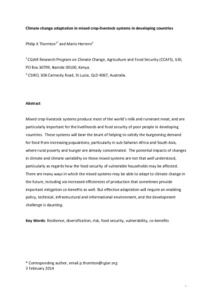Impact of Costa Rica's Program of Payments for Environmental Services on Land Use
Costa Rica's Program of Payments
for Environmental Services (Pago de Servicios Ambientales,
PSA) provides a unique opportunity to evaluate direct
payments as a conservation policy tool. This paper reports
evidence on how much more forest has been conserved in Costa
Rica as a result of PSA contracts with landowners. Such
evidence requires estimating a counterfactual outcome: how
much forest would have been preserved if there had been no


